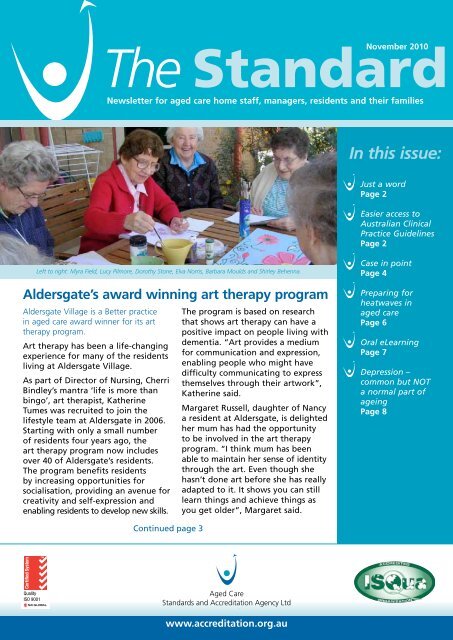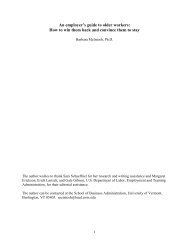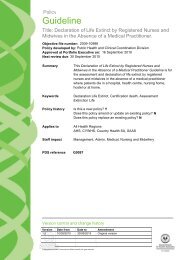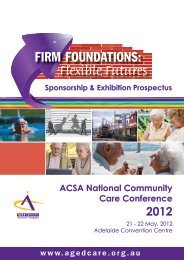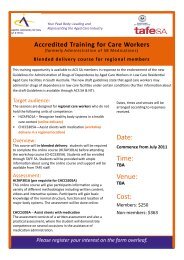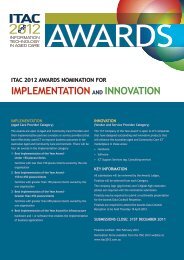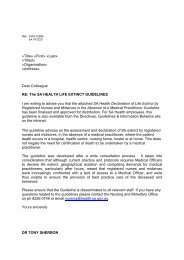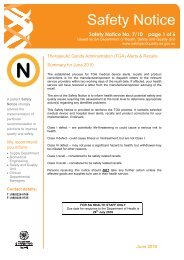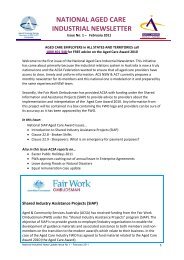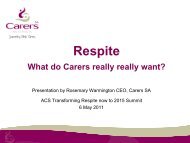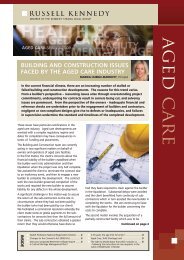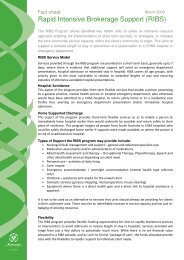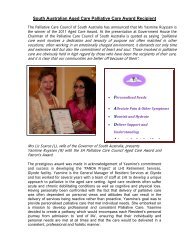The Standard November 2010 - Aged & Community Services SA & NT
The Standard November 2010 - Aged & Community Services SA & NT
The Standard November 2010 - Aged & Community Services SA & NT
- No tags were found...
You also want an ePaper? Increase the reach of your titles
YUMPU automatically turns print PDFs into web optimized ePapers that Google loves.
Response from Michael Preece, ManagerResidential <strong>Aged</strong> Care, Brightwater Care GroupFirstly, when faced with an issue such as this wemust remember that there are a number of <strong>Aged</strong>Care <strong>Standard</strong>s that apply to this case. <strong>The</strong>seinclude but are not restricted to 3.4 Emotionalsupport; 3.5 Independence; 3.7 Leisure interestsand activities and 3.9 Choice and decision making.<strong>The</strong>se should be investigated carefully to ensurewe continue to adhere to these standards forMary.At Brightwater our normal practice wouldbe to consult with the GP and to conduct acomprehensive assessment of the resident’scapabilities. We would observe for signs ofwellbeing and/or ill-being whilst Mary makesher bed and does her laundry. This can be donein an objective manner through Dementia CareMapping or subjective observation by staff and/or family. We would meet with the family andMary to fully discuss the family’s wishes. Wewould encourage the family members to openlydiscuss their request whilst ensuring that Mary hasthe opportunity to talk about what she wants.Brightwater would then take the time to explainto the family the potential detrimental outcomesfor Mary if these tasks were taken away. Forexample Mary may lose her sense of purpose andmotivation, which could lead to social isolationand depression.Care planning would be discussed with the familyand Mary and we would ensure that the agreedoutcomes are reflected in Mary’s care plan. If itis agreed that Mary is still able to continue toundertake these tasks we would reassure thefamily that Mary will have all the assistance orsupervision needed to ensure she can continue toenjoy this activity safely.If Mary’s physical ability to do these tasks wassignificantly impaired and she still insisted shewanted to do them, we would implement thenecessary actions as discussed, as well as seek toagree on a timeframe to reassess the situation. Wealways stress to the family that we welcome theircontinued input and feedback at all times.Response from Marcus Riley,Chief Executive OfficerBallyCaraIndisputably a resident’s family are keystakeholders of an aged care facility and theprovider has an obligation to ensure their inputis part of the care-management for their lovedone. However, the wants, needs and preferencesof the resident are of paramount importanceand must be the guiding element for carestaff. <strong>The</strong> provider must ensure the method instriving to meet an individual resident’s needsand preferences is underpinned by a holistic(person-centred care) approach that entails anunderstanding and a genuine ‘knowing’ of theperson. If this is evident then the chance ofacceptance, support and participation of thefamily increases exponentially. If the family is notparticipative, in the least the approach taken,inclusive of necessary evidence, will providejustification to the family.<strong>The</strong> evidence of the genuine understanding ofthe individual resident could be based on a reviewwhich includes detailed analysis and reportingon his/her background; abilities; needs andexperiences. A review of this nature would thenprecede ongoing research, assessment, planning,documentation, consultation and evaluation ofthe residents holistic care needs and representingtheir human rights.Equipped with the above, staff are then ableto confidently deliver the best possible care tothe resident, advocate on the resident’s behalfand facilitate the resident’s choice and decisionmaking. At the same time the resident’s abilitiesare being maintained and consequently theirindependence.Response from <strong>Aged</strong> Care <strong>Standard</strong>s andAccreditation Agency LtdSituations where the resident’s preferences differfrom those of family members can create asignificant challenge for homes. Although homesneed to consider the concerns family membersmay have for the welfare and safety of residentsthe primary concern needs to be assisting residentsto exercise their choices to meet their needs andpreferences.Both the Accreditation <strong>Standard</strong>s and the Charterof Residents’ Rights refer to the rights of residentsto their personal, civic, legal, and consumer rights.<strong>The</strong>se rights include the right to make choices andmaintain independence. Expected outcome 3.9Choice and decision making states: ‘each resident(or his or her representative) participates indecisions about the services the resident receivesand is enabled to exercise choice and controlover his or her lifestyle while not infringing onthe rights of other people’. Expected outcome3.5 Independence, requires that ‘residents areassisted to achieve maximum independence,<strong>The</strong> <strong>Standard</strong> <strong>November</strong> <strong>2010</strong> 5
Case in pointmaintain friendships and participate in the life ofthe community within and outside the residentialcare service’. <strong>The</strong> Charter of Residents’ Rightand Responsibilities also refers to the rights ofresidents to maintain control over, and continuemaking decisions about, the personal aspects ofdaily life and to maintain personal independence.Mary’s desire to continue to undertake personalcare activities such as making her own bed anddoing her laundry is also related to ExpectedOutcome 3.7 Leisure interests and activities.This expected outcome states ‘residents areencouraged and supported to participate in awide range of interests and activities of interest tothem’. Her preference for undertaking aspects ofher personal care may also be related to privacyand dignity issues (Expected outcome 3.6).It is understandable that family members andsignificant others at times become very concernedabout the welfare of residents. However, althoughthe views and concerns of residents’ families andrepresentatives are an important issue for homesand require open discussion the primary focusneeds to be on the rights of residents and assistingthem to exercise those rights whenever possible.Do you have a ‘case’? Let us know.Email: editor@accreditation.org.auPreparing for heatwaves in aged careEpisodes of very hot weather - known asheatwaves - can cause illness and death.In response, the Victorian Government’s Departmentof Health has released a resource that providessupport to aged care services when coping withheatwaves.<strong>The</strong> residential aged care Heatwave ready resourceprovides information about the health impacts ofheatwaves on older people and provides associatedresources.Advance planning is critical to effective heatwavemanagement and the Heatwave ready resourceprovides homes with a heatwave checklist.In addition to describing the dangers and thewarning signs of heat related illness in aged careresidents, the resource outlines the heatwavepreparations that should be undertaken in relationto two key areas:1. Minimising any avoidable adverse health effectsof extreme hot weather.2. Managing a disruption to essential services suchas a power outage.<strong>The</strong> Heatwave ready resource can be located atwww.health.vic.gov.au/agedcare/publications/racsheatwave/index.htm6 <strong>The</strong> <strong>Standard</strong> <strong>November</strong> <strong>2010</strong>
Oral eLearningA free online learning package on oraland dental health in aged care has beendeveloped by the NSW Dental Assistants’(Professional) Association Inc in partnershipwith NSW <strong>Community</strong> <strong>Services</strong> and HealthIndustry Training Advisory Body.This interactive learning package includesinformation about common oral and dentalhealth issues among elderly people, symptomsand causes of oral health breakdown and skillsto promote oral and dental health as part ofthe day to day care of residents.<strong>The</strong> eLearning package is divided into sevenmodules and takes approximately three hoursto complete. <strong>The</strong> package includes a quiz atthe end of each module to ensure learningoutcomes are achieved.<strong>The</strong> package is available atwww.workplaceskills.com.auEducation coursesRCNA CNE pointsUnderstanding accreditation: a practical toolkit for homes course – three day29 <strong>November</strong> – 1 December <strong>2010</strong> Brisbane6 - 8 December <strong>2010</strong> Parramatta15 - 17 February 2011 Parramatta22 - 24 February 2011 Adelaide28 February – 2 March 2011 BrisbaneVictorian courses are now hosted by <strong>Aged</strong> and <strong>Community</strong> Care Victoria (ACCV)RCNA CNE pointsManaging risk to avoidnon-compliance9 December<strong>2010</strong>Toowoomba8 March 2011 Bundaberg14 March 2011 Perth18 March 2011 Albury20 April 2011 SydneyMaking support contactswork for you26 <strong>November</strong><strong>2010</strong>8 December<strong>2010</strong>15 December<strong>2010</strong>8 February201117 February2011PerthCanberraBairnsdaleNambourBarossaEffective informationsystems2 December<strong>2010</strong>10 February201110 February201116 February201124 February2011NaracoorteOrangeBrisbaneMilduraPerth13 May 2011 Melbourne 3 March 2011 Wollongong 29 March 2011 CanberraNEWFor more information go to www.accreditation.org.au or call 1800 728 589.<strong>The</strong> <strong>Standard</strong> <strong>November</strong> <strong>2010</strong> 7
Depression –common but NOT a normal part of ageingWhile depression is commonin older people, it is not anormal part of the ageingprocess.This is one of the key messages frombeyondblue, as part of its Anxiety andDepression Awareness month duringOctober.<strong>The</strong> independent non-profit organisationwhich works to address issues associatedwith depression, anxiety and relatedsubstance misuse disorders in Australia, hasproduced two resources related to olderpeople and depression.Both the booklet and the fact sheetdifferentiate depression from ‘just’sadness or a low mood, and provide thewarning signs that an older person may bedepressed if, for two weeks, he or she hasfor example, felt sad or miserable most ofthe time or lost interest in most of theirusual activities.<strong>The</strong> resources outline factors whichmake an older person more at risk ofdepression, including: an increase inphysical health problems; chronic pain;side effects from medication; losses suchas from relationships, independence, workand income, self-worth; social isolation;significant change in living arrangements;hospital admission; particular anniversariesand associated memories.While the precise rates of depression andanxiety in older people are not known,studies suggest that between 10 per centand 15 per cent of older people experiencedepression and approximately 10 per centexperience anxiety. Rates of depressionamong people living in residential agedcarefacilities are believed to be muchhigher, states beyondblue, ranging from 34per cent to 45 per cent.‘<strong>The</strong> key to successful treatment is anappropriate assessment by a GP or healthprofessional as different types of depressionrequire different types of treatment,’ saysa spokesman. ‘This may include physicalexercise for preventing and treating milddepression, through to psychologicaltreatment and drug treatments for moresevere levels of depression.’<strong>The</strong> resources provide tips for carers suchas suggesting that the person sees a doctorto offer practical support by assisting theperson to make an appointment or byhelping with transport.For more information visit:www.beyondblue.org.au.<strong>Aged</strong> Care<strong>Standard</strong>s and Accreditation Agency LtdPromoting quality care<strong>Aged</strong> Care<strong>Standard</strong>s and Accreditation Agency LtdPromoting quality improvementContact information<strong>The</strong> Editor, <strong>Aged</strong> Care <strong>Standard</strong>s and Accreditation Agency Ltd.PO Box 773, Parramatta, NSW, 2124email: editor@accreditation.org.au© <strong>Aged</strong> Care <strong>Standard</strong>s and Accreditation Agency Ltd. <strong>The</strong> <strong>Standard</strong> may be copied in whole. <strong>The</strong> <strong>Standard</strong> is intended to provide generalinformation only and should not be taken as constituting professional advice. Readers should obtain further advice in relation to issues raisedin <strong>The</strong> <strong>Standard</strong>. Mention of a person, home, company or product does not mean endorsement by the Agency.To be added <strong>Aged</strong> to <strong>The</strong> Care <strong>Standard</strong> mailing list or to receive extra copies, email your address/mailing details to the editor:editor@accreditation.org.au <strong>Standard</strong>s and Accreditation Agency or Ltddownload your copy from www.accreditation.org.auPromoting improvement in quality8 <strong>The</strong> <strong>Standard</strong> <strong>November</strong> <strong>2010</strong>


